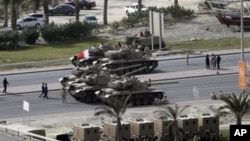Bahrain's military took control of the capital Thursday, hours after riot police firing birdshot, rubber bullets and teargas stormed an anti-government protest camp, killing at least five people and wounding more than 230.
Demonstrators say they were not given any warning before the security forces began firing on them, however the government says a notice was sounded.
Several tanks have since been stationed around the Pearl Roundabout where the protesters had been camping.
The crackdown comes after King Hamad bin Isa al-Khalifa publicly expressed remorse for two men killed by riot police earlier in the week and promised a full investigation into the deaths.
Scores of injured people from Thursday’s crackdown, including women and children, were rushed to hospitals, but medics say the military prevented ambulances from reaching the scene.
This angered many people and led to another anti-government demonstration at the country's main hospital.
Related video report by Henry Ridgwell
Batool al-Alawi was one of the medical professionals who took part. "The tanks were there and they [soldiers] pointed at us to go back so, as part of the Ministry of Health we wanted to show that we were against all the violence and we want to help the injured people," she said.
The chairman of the Bahrain Transparency Society, Abdulnabi Alekry, was also at the hospital protest and said the impromptu gathering proved that many Bahrainis are determined to speak out against the government until their demands are met.
"People did not go to their homes, they are here, they have shifted to here and I think tomorrow there will be a renewal of demonstrations at different parts [of the city] and of course, tomorrow is a Friday. It is going to be a massive protest. So, I don’t think this iron fist is going to solve the problem," he said.
The protesters are mostly Shi’ite Muslims who say they are treated as second-class citizens by the country’s running Sunni minority. They are calling for more rights and for the long-serving prime minister to resign.
Since the demonstrations turned deadly, many protesters have also started chanting for the ouster of the royal family.
The vice president of the Bahrain Center for Human Rights, Nabeel Rajab, says the situation is a cause of concern.
"I am afraid that it will push many people into violence. It is going to push people into extremism because they know their government can’t understand dialogue, can’t understand freedom of expression, can’t understand freedom of gathering in peaceful protests," Rajab said.
Eighteen members of the leading Shi’ite al-Wefaq party have quite parliament to protest the crackdown on demonstrators.
They say they will return only when the king agrees to transform the nation into a constitutional democracy with an elected government.




